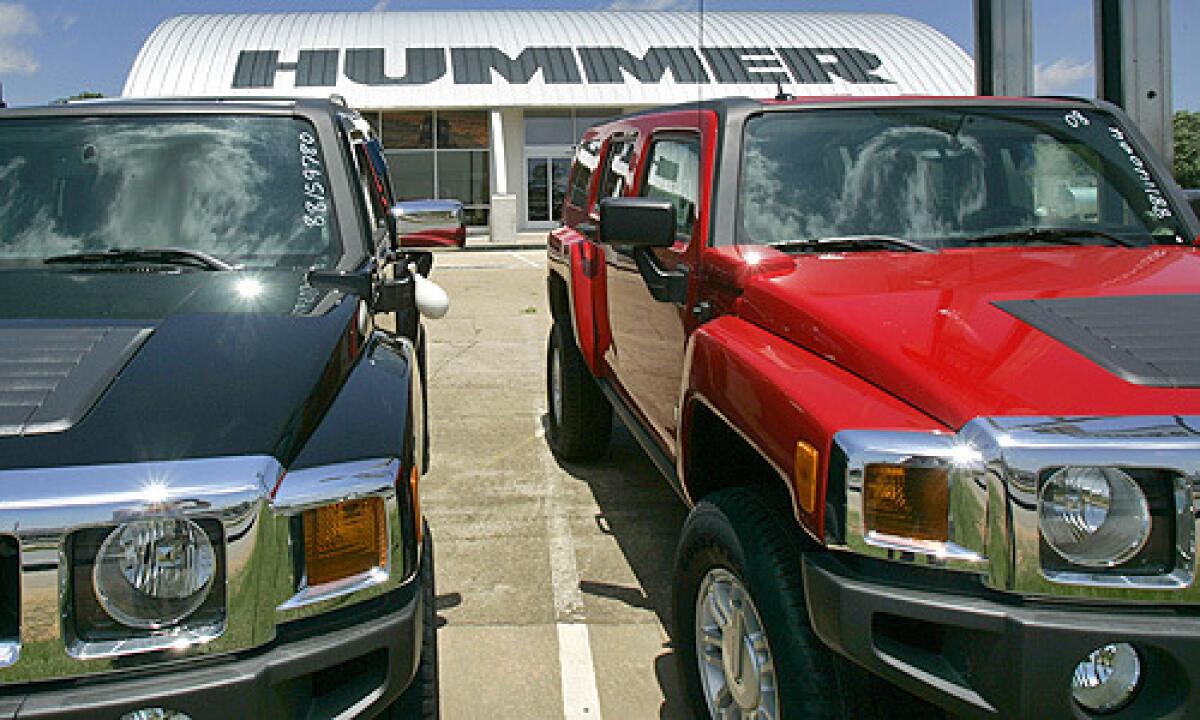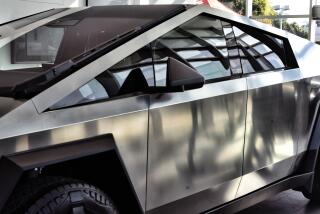Pickup truck, SUV sales run out of gas

A month of gasoline prices near $4 a gallon was enough to sour Americans’ long love affair with trucks and sport utility vehicles, pushing them back into sedans -- and driving Detroit’s automakers into deeper trouble.
U.S. sales results released Tuesday showed cars outselling gas-guzzling trucks and SUVs by almost 200,000 in May -- the biggest margin since 1996. That was bad news for U.S. automakers, whose lineups are heavily skewed toward large, inefficient vehicles, but a boon to their car-focused Asian rivals.
General Motors posted a sales drop of about 27% from a year earlier and said it would close four truck plants, prepare its Hummer brand for a possible sale and focus on making smaller cars. Chrysler’s 25.4% sales decline put it behind Honda in monthly sales for the first time.
And, after 17 years, Ford’s F-Series trucks were dethroned from the top sales position, falling to No. 5 behind the Honda Civic, Toyota Corolla, Toyota Camry and Honda Accord.
“I think it’s a watershed moment,” said Jim Farley, head of marketing at Ford.
For the month, overall vehicle sales in the U.S. were 1.4 million, down 8.4% from a year earlier, according to Autodata Corp. Based on the May sales rate, the industry is on pace to sell just 14.3 million vehicles this year in the U.S. In 2007, total sales were 16.1 million.
For nearly a decade, Americans bought more light trucks -- a segment that includes pickups, SUVs and minivans -- than cars. But starting in March, cars edged ahead. The gap widened in April, and in May, 193,559 more cars than light trucks were sold.
“The market has shifted dramatically from large gas-guzzling vehicles to smaller, fuel-efficient vehicles,” said Dennis Virag, president of Automotive Consulting Group in Ann Arbor, Mich.
GM in May saw a 37% decline in light truck and SUV sales and its share of the overall U.S. market dropped below 20%, a new low for the automotive giant that in 1980 had 45% of the U.S. market.
GM Chairman Rick Wagoner said the company believed that American consumers were shifting permanently from SUVs toward smaller vehicles. He said the company’s board had greenlighted production of a new small car in an Ohio factory and of its Volt electric vehicle -- set to debut in 2010 -- in Detroit.
“We at GM don’t think this is a spike or a temporary shift,” Wagoner said in a conference call before the company’s annual shareholder meeting in Wilmington, Del.
It was a different story for many Asian automakers.
The fuel-efficient Honda Civic compact had a record month with 53,299 sold, a 38.5% increase from May 2007. It and other small cars including the Fit helped Honda, which sells very few light trucks and and is heavy with fuel-efficient cars, post a 15.6% increase in vehicles sold for the month.
Hyundai, Mazda, Kia and Subaru posted sales increases for the month. So did Nissan, which saw an 8.4% increase in sales, driven by a 43% burst from its Altima sedan, which like the Civic comes as a hybrid as well as a traditional drivetrain. But Nissan’s results were pulled down by a lineup that includes large SUVs such as the Armada, whose sales fell 52%, and the Titan full-size pickup, which was down 56%.
The difficulties of that delicate balancing act between cars and light trucks was perhaps best illustrated by Toyota, which had a 4.3% decline in sales for the month despite a mix of cars that includes the popular Yaris, Camry, Corolla and Matrix models. The drag, in the Japanese automaker’s case, was the trucks and full-sized SUVs it makes in the U.S.
“All of our previous assumptions on the full-sized pickup truck segment are off the table,” said Bob Carter, head of Toyota’s U.S. sales unit.
Of the many models crippling GM sales, the worst have borne the Hummer nameplate. In May, Hummer purchases declined 60%, and through the first five months of the year it is the marque that has slipped the most, down 36%, placing it behind brands such as Chrysler, Bentley and even Maybach. The Hummer H3 gets an average of 15 miles per gallon, according to the Environmental Protection Agency.
“At this point, we are considering all options for the Hummer brand,” Wagoner said. “Everything from a complete revamp of the product lineup to partial or complete sale of the brand.”
No possible buyer has been named for the division, which was for a few years -- when gasoline cost less than $3 a gallon -- one of GM’s best-performing. Last week, GM’s stock hit a 26-year low, falling to $17.38. In trading on Tuesday, GM shares rose 14 cents, to $17.58.
At Tuesday’s shareholder meeting, speakers criticized Wagoner for what they called his excessive compensation in light of the company’s poor performance. According to one calculation, GM’s chairman received compensation worth nearly $16 million last year, up from $9.6 million in 2006. Nevertheless, a measure to tie executive pay to performance was defeated at the meeting.
Besides Hummer, another SUV brand that has been rumored to be on the block is Jeep, considered the one salable product among the holdings of cash-starved Chrysler. The privately held automaker has repeatedly denied that it intends to sell Jeep, but analysts say it ought to have considered that option some time ago. Jeep’s top-selling vehicle, the Wrangler, gets an average of 18 mpg.
“Chrysler should have sold it two years ago,” analyst Virag said. “Today, Jeep is seen as a portfolio of products that are pretty inefficient.”
After years of juicy profits from light trucks, all three U.S. automakers are scrambling to shift production toward cars.
GM said Tuesday that it would close plants in Oshawa, Canada; Moraine, Ohio; Janesville, Wis., and Toluca, Mexico. Several thousand jobs could be affected. Those plants are responsible for pickup trucks and SUVs such as the Chevrolet Silverado, the GMC Envoy and the medium-duty Chevy Kodiak and are expected to end production no later than the end of 2009.
Sales at Ford fell 15.6% in May, buoyed a bit by a 3% gain in its sales of cars such as the popular Focus. Last month, Ford said that it would cut worker shifts and total production at a handful of plants that make its largest SUVs and pickup trucks, and that it would produce the subcompact Fiesta in a plant outside Mexico City that currently makes the F-series pickup.
Even Chrysler, which of all carmakers has the product mix most heavily slanted toward light trucks, with 71% of its vehicles sold through May falling into that category, is looking to cars. In April, it announced that Nissan would produce a small car for it, while Chrysler would make trucks for Nissan in a Mexico factory.
Still, some worry that Detroit’s newfound love of small cars could backfire because of the sheer size and inertia inherent in such large operations.
“Oftentimes what we see from Detroit is an overreaction too late,” said Wes Brown, principal of Los Angeles marketing research firm Iceology. “They make seismic shifts to react to what the market is doing today, and by the time they get the product to market, the market has moved on.”
More to Read
Start your day right
Sign up for Essential California for news, features and recommendations from the L.A. Times and beyond in your inbox six days a week.
You may occasionally receive promotional content from the Los Angeles Times.






